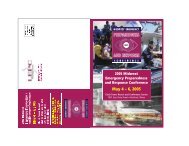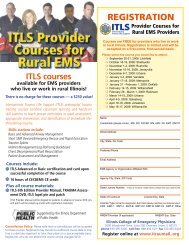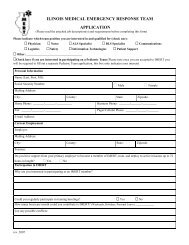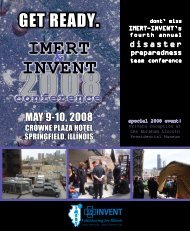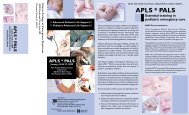Summit Invitation - The Illinois Medical Emergency Response Team
Summit Invitation - The Illinois Medical Emergency Response Team
Summit Invitation - The Illinois Medical Emergency Response Team
You also want an ePaper? Increase the reach of your titles
YUMPU automatically turns print PDFs into web optimized ePapers that Google loves.
<strong>Summit</strong> AgendaThursday, July 16, 2009T2: September 2008 Flood <strong>Response</strong>: <strong>The</strong> Role of CookCounty Government and Lessons Learned• Robert King• Gina Massuda Barnett, M.P.H.• LaTrice Porter-Thomas, M.P.H., L.E.H.P.This session will provide an overview of Cook County government’sresponse to floods that impacted several municipalitiesthroughout suburban Cook County in September 2008 and willhighlight the role of the Cook County Department of Public Health.Presenters also will discuss lessons learned, including the considerationof how systems created specifically for public health-drivenemergencies can be applied effectively to all hazards.T3: Wastewater and Portable Sanitation Needs During a Disaster• Chad Moorman, L.E.H.P.Participation in this session will provide insight in planning andunderstanding wastewater concerns during a disaster. It also willprovide recognition of portable sanitation concerns and needs,developing an effective response, assessing available resources,pre-planning contracts and communication. A timely implementationof a prepared response in a disaster will have a positiveimpact on public health as well as provide good governance ofresources.T4: Why Do We Need to Develop Incident Action Plans?• Joseph V. Gasparich, B.A.<strong>The</strong> NIMS guidance stresses the development of incident actionplans (IAP). What value does an IAP have for public healthresponders? This session will look at the incident action plan andwhat value it can have for public health responders.T5: COOP Accreditation• Darryl Dragoo• Gretchen JarrettThis session will provide participants with an understanding of theContinuity of Operations Plan (COOP) database, maintaining thedatabase, and testing, training and exercising COOP.T6: <strong>The</strong> CDC <strong>Illinois</strong> Meta-Leadership Initiative:Update and Panel Discussion• David W. Culp, Ph.D.• Italo De Santis• Leon Dingle Jr., Ph.D.• Francesca M. Maher• Richard Reb, C.R.T.• Victoria H. Sharp• Jeannette M. Tandez, M.P.H.• Andrew TwomblyThis session will provide information on the Meta-Leadershipinitiative, highlight best practice examples, and discuss <strong>Illinois</strong>’Meta-Leadership action plan and next steps going forward. <strong>The</strong>panel will include representatives from government, community,multi-sector, private-sector, and non-profit sector who will discusswhat they are doing in Meta-Leadership, key success factors andhurdles they overcame.T7: Engaging At-Risk Populations Using a CommunityCommunications Network• Carina L. Elsenboss, M.S.• Barbara Fox, M.S.• Kimberley Conrad Junius, M.F.A.• Frankie-Marie Shipman, M.P.H.• Darnell L. Thomas, M.S., M.P.H., C.H.E.S.To communicate with hard-to-reach populations (populations thatmay not be reachable through traditional media such as broadcasttelevision, cable, radio or the Internet) in times of crisis, advanceplanning and networking with trusted resource people is critical.One way to reach vulnerable populations is through a CommunityCommunications Network: a network of social service agencies,foreign language media, etc., that have agreed to push messagesout to their members or clients in a timely fashion during routineand emergency situations.T8: Disaster Preparedness and Recovery for Older Adults• Katherine Reuter, B.S., M.S.Disasters come in many different forms, such as fires, severestorms, tornadoes, flooding, earthquakes, hazardous materials,terrorism and others. This presentation will help older adults learnhow to prepare their homes and families for natural and man-madedisasters; create and maintain a disaster plan; prepare a disastersupply kit for their homes and cars; and take action steps in handlingvarious disaster recovery situations.10:30 a.m. – 10:45 a.m.Break10:45 a.m. – 12:15 p.m.Closing Plenary SessionKeynote AddressPlan, Prepare, Practice• Richard Sheirer



